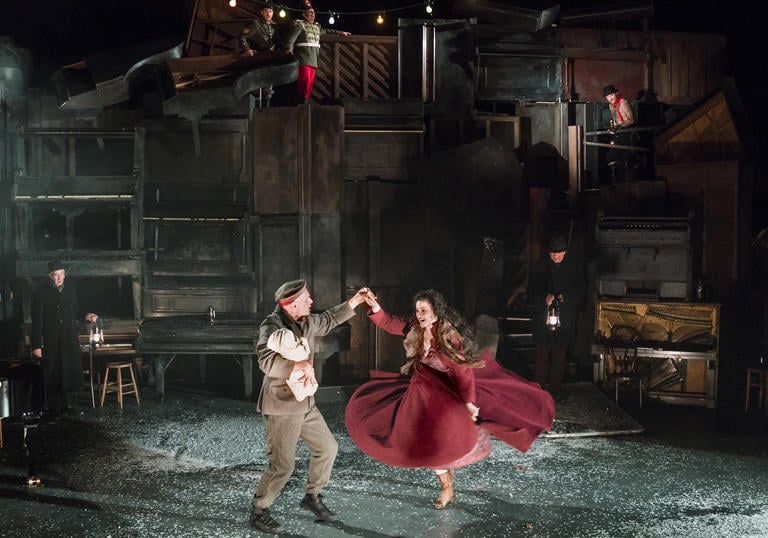The great works of music and drama, for all that we mentally file them away in sealed boxes, share connections that can still surprise us. Woyzeck in Winter is a fusion of two early 19th-century masterpieces whose similarities are uncanny. Woyzeck, the play by Georg Büchner, and Die Winterreise, the song cycle by Franz Schubert set to poems by Wilhelm Müller, were written within nine years of one another. Each was the seminal work of a troubled genius who died young. Each narrates the course of one man’s obsessive thoughts and his downward slide towards dissolution. The play is a collection of 24 scenes, the song cycle 24 songs. Placed side by side, playscript and lyrics could be said to be having a conversation.
The Dublin-based theatre director Conall Morrison has spent many years absorbing both works. Buchner’s play, which follows the struggles of a put-upon foot soldier in the German-Austrian army, ‘grabbed him by the throat’ with its energy, its vividness, its darkness. He came to Winterreise (Winter’s Journey) soon after, and the two works became a twin obsession, Morrison finding the parallels between them more and more intriguing. Subjecting the material to the workshop process (‘another way of saying we kicked it around’), convinced him that play and song cycle together could create a new entity, one that shed light all round.
Woyzeck in Winter not only takes the bold step of removing Schubert’s songs from the traditional recital-room setting. More controversially, it puts them in the mouths of actors. While aware that he risks being accused of disrespecting the art of Lieder singing, Morrison contends that using non-classical voices along with a new English translation ‘unlocks a kind of rough honesty’ in the poetry. The music drives Büchner’s play, which in turn becomes a kind of ballad opera, inhabiting a storytelling world closer to that of Bertold Brecht and Kurt Weill, or even Nick Cave or Tom Waits.
Schubert’s songs are threaded through the drama, some sung by the Woyzeck character, others by his faithless lover Marie. Some are reprised, some sung in chorus, others performed by piano alone. The piano becomes a metaphor for Woyzeck’s mind – a complex machine capable of expressive extremes but prone to go out of tune. The set resembles a Caspar David Friedrich landscape, a mountainside built of disused pianos, embedded at the centre of which is the Steinway which provides the show’s essential soundtrack.
The stakes are high, the passions are strong, the struggle is intense
In casting Woyzeck in Winter, Morrison has looked for actors who ‘have their own black magic, with voices that are raw, honest, colourful, alive, that bring not beauty and polish to the lyrics, but immediacy’. Leading the cast, Patrick O’Kane and Camille O’Sullivan are extraordinary performers by any measure.
Might the combined dose of Schubert and Buchner merely double the misery? Not a bit, Morrison says. ‘Although both the original works are shot through with pain and heartbreak, neither Woyzeck nor the singer of Winterreise is prepared to go gently. There is in both a strange sense of exhilaration about the soul’s journey into the dark. It’s like a fearsome embrace. The stakes are high, the passions are strong, the struggle is intense.’


